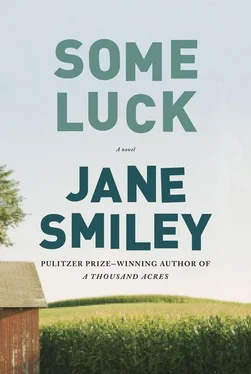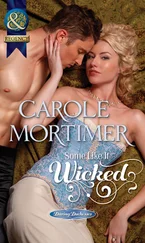The room ceased shaking, and Frank took some breaths.
Papa said, “He screams, but he doesn’t cry or whine. I’ll say that for him.”
WALTER THOUGHT he probably grew too much oats, but if you were a Langdon and your mother was a Chick, then it was natural to plant oats, eat oats, feed oats, bed oat straw, and, most of all, enjoy all the stages of oat cultivation. He had talked his brother-in-law Rolf — who had taken over Opa and Oma’s farm, though the old folks were still living in the house — into planting forty acres this year, too. Rolf was twenty, but he had as much gumption as a ten-year-old, Walter thought. Rosanna had gumption for both of them.
Walter especially liked binding and shocking the oats — the weather was hot, and grit of all kinds got into your hair and your clothes and your boots and your eyes and your nose, but a field of shocked oats was an accomplishment, and foretold a barn-load of straw and grain that would get everyone, animals and people, through the winter. Oat straw was a beautiful color — paler than gold but more useful.
And Walter also liked the sociability of August — men and boys from all over the county came to his farm, and he went to their farms, and there was plenty to eat and to talk about. It didn’t hurt that Jake and Elsa were an admirable team of horses to be pulling the binder — patient, strong, good-looking, stylish grays. Didn’t matter who was driving them — a boy could drive them and they would do their job. No running away, like Theo Whitehead’s team of Shires did that year, breaking up the binder on the fence line, and slowing the threshing by four days while everything was put back together.
When they came in for dinner, Rosanna had it all organized out back, under the hickory trees. Tables with cloths lined up in the shade, and the bread and the beans and the caramelized carrots and the sweet corn and the watermelon and the slaw all set out, so that they sat themselves down at their places, and out she came with the roasts, two of them, enough for everyone to have plenty, with her own butter in the middle that she made and salted and sold to the store in town — the best butter in the county, everyone said.
In addition to their own two families, there were the Whiteheads and the Lewises and the Smiths, whom Walter and Rosanna only saw at threshing and harvest, everyone in family groups, the men to help with the threshing, the women to help with the cooking, and the youngsters to play — Rosanna set the youngsters up in the side yard, with two different kinds of swings, a tire swing and a bench swing — and the girls were put in the charge of Eloise, who had them turning the crank on the ice-cream churn. Even though Walter didn’t grow any peaches, and didn’t know anyone who did, Rosanna got some in town — a peck of them — and the ripest went into the ice cream. Of all the families who did their threshing together and therefore their eating together, Walter’s family was the only one who made ice cream. The day at Walter’s was a long one, because he grew so much oats.
But look at Frank, an advertisement for oats if ever there was one. He was inches taller than the Lewis boy, who was a month older, and he could outrun that Lewis boy, too. What was his name? Oh, Oren. The big boy, almost four, was David. David Lewis was standing facing Frank as Walter passed them, shouting, and Frank was smacking the ground with a branch he’d found. Oren was standing there, looking back and forth between the two of them, and this is what Walter heard — he heard David shout, “Okay, Frank, you stand there, and you tell me what to do.” This was enough to make Walter chuckle, and then Frank called out, “David, run to me, push me!” Frank dropped the branch and spread his arms.
When David ran at him, Frank turned his shoulder to the older boy and knocked him down. Then the boys rolled over in the grass. Rough play, and Walter knew Rosanna and Emily Lewis would stop it, but since Frank had dropped the branch, it was hand-to-hand combat — all boys, Walter thought, needed plenty of that, especially Oren, who stood there with his thumb in his mouth. It was his private opinion that he and Howard hadn’t been allowed enough shenanigans — when they weren’t put to tasks, they were to sit still, do as they were told, speak when spoken to. As a result, he sometimes thought he had never known Howard at all. Walter sped up his step. He was hungry, and he didn’t want to hear anything from Rosanna about letting those boys get away with murder.
As soon as Walter washed his hands at the pump, that was the signal for all the men to clean up as best they could and find themselves places at the table.
The first thing all of them did was down several glasses of water, and then the chorus went around: “Hot one! How hot do you think it is? Over a hundred yet? Not so damp, though. Humidity was worse the other day, over at Bill Whitehead’s. Down by the river there, always damp.” Head shaking. “Got a good crop, though, say that for him.” Then, “Try this, Rolf. Rosanna knows her slaw. Nice piece of meat, Walter. Lean, but tasty, I’ll say. How many you gonna slaughter this year? I got jars of brisket and sausage bursting out of the cellar, don’t know why, just can’t eat enough of it, I guess. Didn’t have to kill a chicken until May this year. Nice melons, too. Soil around our place isn’t sandy enough for good melons. How’s your potatoes looking this year? I didn’t even plant them in one spot, just covered ’em with manure and straw. Every so often, I grab a plant and lift it up, and look at the potatoes.” And then, when they were full, “You can go ahead and grow all the corn you want, Otto, but you ain’t gonna make a profit from it unless you feed it to your pigs. More pigs, more profit. Walking dollars is what I call hogs. We got some Durocs this year, from Martha’s cousin. I like the Hampshires for the hams, but Durocs are longer in the bacon, her cousin says.” Then there was a long conversation about hog breeds. Walter’s own hogs were Berkshires, and they liked oats. But what didn’t they like? Walter felt happy. There was talk about cars — Bill Whitehead’s cousin over in Cedar Rapids had bought his second Model T for $260, but he’d had to pay another forty for an electric ignition. “Least you can get that now,” said Ralph Smith. “Cranking that thing before the war, my uncle had his hand broke.” Walter cleared his throat but didn’t say anything. How a person could have a farm with a mortgage and a car, too, was a problem he hadn’t solved, and so he allowed his father’s preference for horses to prevail.
Here came Rosanna with Joe, the baby. Joe was five months old now, and big and healthy. You wouldn’t know from looking at him that it had been touch and go there for a bit — though how touch and go, maybe Walter himself didn’t know. Small baby, even though he was late, according to Rosanna’s and her mother’s calculations. And Rosanna’s mother thought he looked late: “Like a little old man,” she said, “worn out and wrinkled.” And then the milk didn’t come in the first day, or the second, and there was no denying that she was worried. As for Dr. Gerritt, he was so little help that Mary just sent him away. Walter himself thought that it was the oatmeal that did the trick — Rosanna could keep it down, first with water, then with milk, then with cream, and then with butter. She got better every day, and after that little Joe got better, and look at him now. Walter’s mother said what she always did, that he was the spit of Walter himself, plenty of dark hair and fat cheeks. Walter watched Rosanna as she carried him around each table, saying, “Joey, Joey, look at all of our friends come to see you!” Joey had one hand on her cheek, and she held the other hand in hers. Rosanna said that he wasn’t as far along as Frankie had been at this age, but Walter himself couldn’t remember. A spring baby got out more, was all he knew, so he had more of a sense of Joey than he had had of Frank. Joey was still getting up in the night, but Rosanna didn’t mind. She was a little protective of him.
Читать дальше












